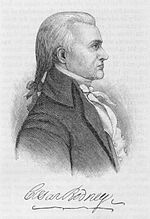Caesar Rodney
| Caesar Rodney | |
|---|---|

20th-century image; no contemporary portrait exists.
|
|
| President of Delaware | |
|
In office March 31, 1778 – November 6, 1781 |
|
| Preceded by | George Read |
| Succeeded by | John Dickinson |
| Continental Congressman from Delaware |
|
|
In office August 2, 1774 – November 7, 1776 |
|
| Personal details | |
| Born |
October 7, 1728 Kent County, Delaware |
| Died | June 26, 1784 (aged 55) Kent County, Delaware |
| Resting place | Kent County, Delaware |
| Residence | Kent County, Delaware |
| Profession | politician, lawyer |
| Religion | Episcopalian |
| Signature | |
| Military service | |
| Service/branch | Militia |
| Battles/wars | American Revolutionary War, French and Indian War |
Caesar Rodney (October 7, 1728 – June 26, 1784) was an American lawyer and politician from St. Jones Neck in Dover Hundred, Kent County, Delaware, east of Dover. He was an officer of the Delaware militia during the French and Indian War and the American Revolution, a Continental Congressman from Delaware, a signer of the Declaration of Independence, and President of Delaware during most of the American Revolution.
Caesar Rodney was born in October 7, 1728 on his family's farm, "Byfield", on St. Jones Neck in East Dover Hundred, Kent County, Delaware. Caesar was the eldest of son of eight children of Caesar and Elizabeth Crawford Rodney and grandson of William Rodney. William Rodney emigrated to the American colonies in 1681–82, along with William Penn. Speaker of the Colonial Assembly of the Delaware Counties in 1704. Rodney's mother was the daughter of the Rev. Thomas Crawford, Anglican rector of Christ Church at Dover. Among the Rodney family ancestors were the prominent Adelmare family in Treviso, Italy, as attested by genealogy studies.Byfield was an 800-acre (320 ha) prosperous farm, worked by slaves. With the addition of other adjacent properties, the Rodneys were, by the standards of the day, wealthy members of the local gentry. The plantation grew to 1,000 acres, and was worked by 200 slaves; it earned sufficient income from the sale of wheat and barley to the Philadelphia and West Indies market to provide enough cash and leisure to allow members of the family to participate in the social and political life of Kent County.
At the age of 17 and upon the death of his father in 1746, Caesar's guardianship was entrusted to Nicholas Ridgely by the Delaware Orphan's Court.
Caesar was educated when he was 13 or 14 years old. He attended the Latin School in Philadelphia, Pennsylvania until his father's death. Caesar was the only one of the Rodney children to receive anything approaching a formal education.
...
Wikipedia
